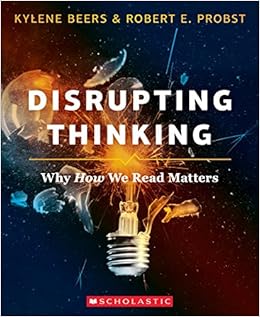
I began reading Kylene Beers and Bob Probst's text Disrupting Thinking this afternoon as a part of our district's department chair book study. As an avid reader, I was excited to get my hands on this text to see what it may confirm or challenge in my own reading instruction. I hope that I am a teacher that teaches students to fall in love with reading, but I know there were many times where the love of the book was secondary to that state assessment that was looming over my head. I struggled with maintaining the balance of skill instruction in preparation for assessments and closing the door and allowing my students to become immersed in a text that would truly change them as readers.
In chapter 1 of the text, Beers and Probst listed out a list of typical assignments that had been observed while visiting classrooms...there were many listed that I kept in my toolbox of instruction.
- write a summary
- retell the story
- compare and contrast two characters
- list the steps
- create a timeline
- draw the parts of a cell
- outline the chapter
- cite the evidence
- explain the main idea and supporting details
- answer the questions
- complete the plot structure template
- define the vocabulary words
- discuss the causes and effects
Beers, G. Kylene, and Robert E. Probst. Disrupting Thinking: Why How We Read Matters. Scholastic Inc., 2017.
When I look at the list above, I don't think there is anything necessarily wrong with giving these types of assignments, but I wonder what harm is done to developing readers if this is ALL we do. Are we only teaching students to EXTRACT something from the text each time they read? Do my students only know to EXTRACT evidence to support their answer when we read in class? Is the focus on EXTRACTION activities killing the love of reading with students?
I'm looking carefully at my own practice to see how much of my conversation with teachers is spent discussing EXTRACTING vs. TRANSACTING. Transacting with a text is more than pulling information. It is about interacting with a text in a meaningful way, finding out how books change us and move us. I'm curious to know how we can make reading more about TRANSACTING than EXTRACTING?
Needless to say, my brain is working through all of this and I'm being challenged to reflect.



No comments:
Post a Comment
Thanks for stopping by for a visit!